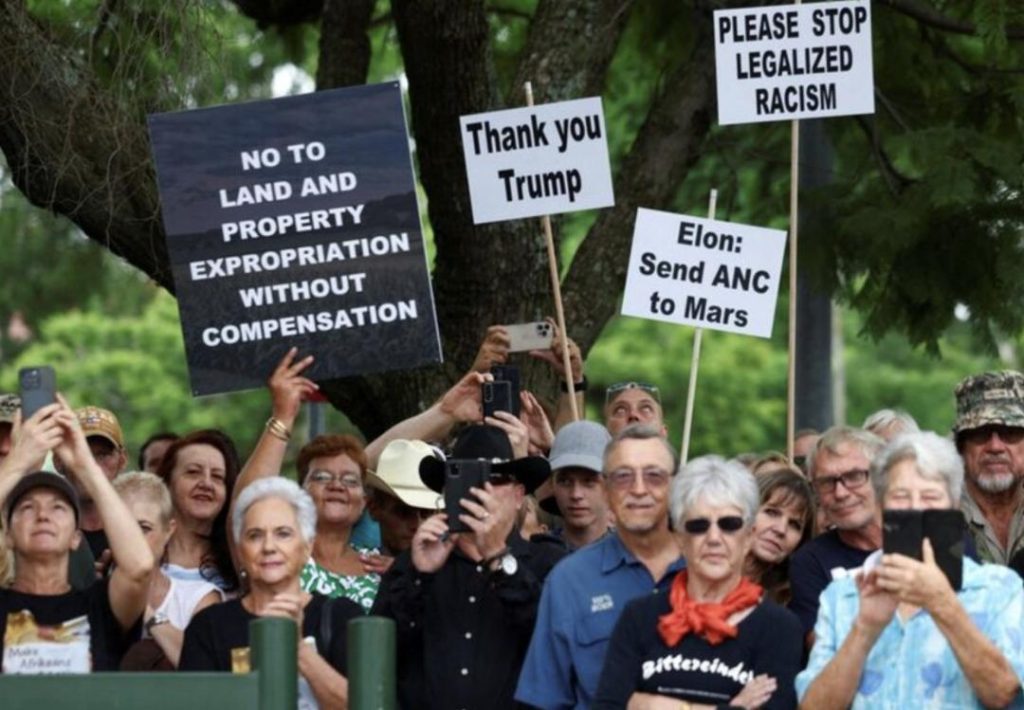
1st White S Africans reach US under Trump’s contentious refugee plan
In a move that has sparked controversy and debate, a group of 49 White South Africans has arrived in the United States under a refugee plan announced by the Trump administration in February. The group, which departed from their homeland on a private charter plane, has been relocated to the US, claiming that they had been subjected to racial discrimination by the South African government.
The controversy surrounding this refugee plan has been brewing for months, with critics accusing the Trump administration of racial bias and hypocrisy. The plan, which was announced in February, aimed to provide refuge to White South Africans who claimed to have been persecuted by the South African government due to their race.
The South African government, however, has vehemently denied these claims, stating that the allegations of racial discrimination are baseless and that the country is committed to addressing all forms of discrimination and promoting equality for all its citizens.
The group of White South Africans who have been relocated to the US is comprised of farmers, businesspeople, and others who claimed to have been targeted by the South African government due to their race. They were resettled in various parts of the country, including Texas, Tennessee, and Florida, and were provided with temporary housing and financial assistance to help them get settled.
The Trump administration has defended the refugee plan, claiming that it is necessary to protect the human rights of White South Africans who are being persecuted by their government. The administration has also argued that the plan is necessary to promote diversity and inclusion in the US, as White South Africans bring unique skills and perspectives to the country.
However, critics of the plan have argued that it is a textbook example of white privilege and that the Trump administration is using it to further its own political agenda. They have pointed out that the plan is not based on any credible evidence of racial discrimination in South Africa, and that it is a thinly veiled attempt to promote white supremacy.
The controversy surrounding the refugee plan has also sparked debate about the role of the US in addressing human rights abuses around the world. Some have argued that the US has a responsibility to take action to protect the human rights of all individuals, regardless of their race or ethnicity. Others have argued that the US should focus on addressing human rights abuses in its own country, rather than getting involved in the affairs of other nations.
The issue has also highlighted the complex and often fraught relationship between the US and South Africa. The two countries have a long history of cooperation and friendship, but they have also had their share of disagreements and conflicts. The refugee plan has raised questions about the nature of this relationship and whether it is based on mutual respect and trust.
In conclusion, the relocation of 49 White South Africans to the US under a contentious refugee plan has sparked controversy and debate around the world. While the plan has been defended by the Trump administration as a necessary step to protect the human rights of White South Africans, critics have argued that it is a thinly veiled attempt to promote white supremacy and that it is not based on any credible evidence of racial discrimination in South Africa.
As the debate continues to rage on, it is clear that the issue will have far-reaching implications for the US and South Africa, and for the global community as a whole. It is a reminder that the fight for human rights and racial justice is ongoing, and that we must continue to work towards creating a more just and equitable world for all individuals, regardless of their race or ethnicity.
Source:






